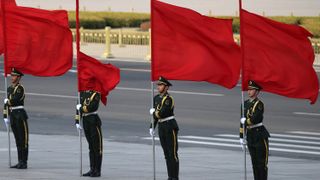Foreign Minister Marise Payne’s meeting with Chinese counterpart Wang Yi is good news. It may even pave the way for a leaders’ summit within weeks.
Is it a genuine breakthrough and a new era in bilateral relations? Was the recent freeze the result of poor statesmanship, a charge sometimes levelled against the former Turnbull government with respect to China? And will Scott Morrison’s government pursue a different path?
China will seek to reset the diplomatic relationship in a way that is in accordance with Beijing’s preferred terms.
And it will succeed if we believe getting along is always preferable to incurring the displeasure of another government.
China will seek to reset the diplomatic relationship in a way that is in accordance with Beijing’s preferred terms.
But good diplomacy is not simply being agreeable. It is the skill of managing external relationships in pursuit of important objectives and principles.
Indeed, we avoid potential problems ahead if we view interactions with China as opportunities to politely reiterate to Beijing that key Australian interests and values are not for the turning.
Two case studies are instructive in reminding the Morrison government of the importance of conviction and resoluteness when dealing with China.
The first concerns the ill-fated policies of the South Korean government of Park Geun-hye from 2013 to last year.
When Park assumed power, she made the decision to abandon the forthright policies of her predecessor, Lee Myung-bak, in regard to Beijing. Park labelled her first official visit to Beijing as a trip of “heart and trust”. Seoul announced it would focus on areas of co-operation and downplay issues of disagreement.
In 2015, South Korea was the only US ally or security partner to send its head of state to attend the military parade to celebrate China’s 70th anniversary commemorating the end of World War II — an event glorifying the Chinese Communist Party and condemning Japanese imperialism. The idea was to forge a special relationship with China.
All seemed well until Park took the responsible decision in 2016 to install the US-operated Terminal High Altitude Area Defence anti-ballistic missile defence system in response to North Korea’s increasingly provocative missile and nuclear tests. Accustomed to being accommodated and consulted, an enraged China imposed economic sanctions on South Korea, believed to have cost its economy more than $10 billion last year.
Beijing’s kinder face reappeared only when Park’s successor, Moon Jae-in, agreed to the “three nos”: no further US anti-ballistic missile systems, no integration into a region-wide US missile defence system, and no trilateral military alliance with the US and Japan.
Japan sets the better standard. In 2013, Prime Minister Shinzo Abe announced Japan’s desire to make a “proactive contribution to peace” and subsequently reinterpreted sections of the constitution to allow Japan the right of “collective self-defence”, opening up the possibility for Tokyo to join in military actions with allies to protect the Japanese people and their interests. Naval port visits to Southeast Asian claimant states take place at a steady pace, as does Japan’s relationship with Taiwan. As recently as September, a Japanese submarine participated in war games in the South China Sea for the first time.
As China reaches out to the Morrison government, one should remember that the latter remains a somewhat lonely and distrusted rising power despite its economic importance.
Abe has complicated Chinese leader Xi Jinping’s plans to secure political, strategic and diplomatic obeisance from Asian powers.
Tokyo pursues its interests regardless of whether there is Chinese approval or even understanding. Japan endured years of Chinese criticism and condemnation before the recent diplomatic rapprochement when Xi and Abe met in Beijing late last month to herald a new era of friendship and co-operation. Consistency and the diminishing of expectation that one can be easily seduced, intimidated or deceived is the art of good diplomacy.
As China reaches out to the Morrison government, one should remember that the latter remains a somewhat lonely and distrusted rising power despite its economic importance.
Beijing has been forced on the back foot by Donald Trump’s administration on issues such as trade, political influence and strategic policy. Despite its practised veneer of self-confidence and the carry-on of a country that seemingly holds all the aces, China cannot afford permanently poor relations with Australia. An enduring platform for good relations cannot begin with silence on issues over which one disagrees. Protecting the integrity of Australian institutions from foreign manipulation and interference, our opposition to illegal seizure and militarisation of maritime territories, and illegal trade practices and intellectual property theft matter as much now as they did before the change in leadership.
A diplomatic thaw and the steady flow of ministerial visits to China is welcome — but not at any price.






